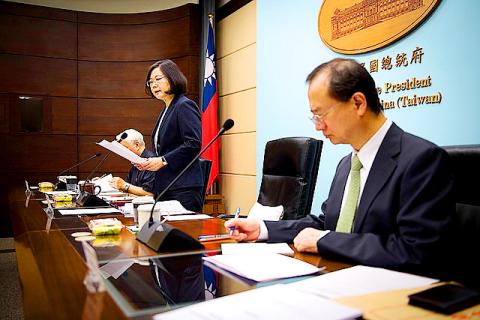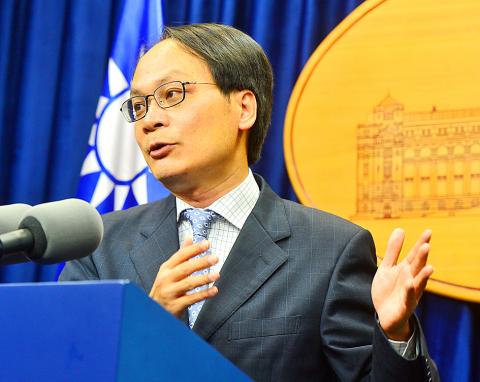President Tsai Ing-wen (蔡英文) yesterday outlined the key areas of focus for judicial reform, including increasing courtroom transparency, improving the selection and discipline of judges and prosecutors, bolstering judicial neutrality and professionalism, and establishing “trials with civic participation.”
Tsai made the comments at the sixth general meeting of the preparatory committee for the National Congress on Judicial Reform held at the Presidential Office, calling the items necessary to meet the public’s expectations.
“The courtroom must become more transparent by various means, including issuing verdicts that are comprehensible to the average person. The process for selecting competent judges and prosecutors and for weeding out incompetent ones must be improved. The professionalism and political neutrality of the judiciary must be bolstered. A system for civic participation in trials must be instituted,” Tsai said.

Photo courtesy of the Presidential Office
She also instructed agencies to make detailed proposals and set a clear timetable for their implementation.
The committee has worked hard over 40 sessions since November last year to create an agenda that comprises the most important items, Tsai said.
As legal reform must be based on popular support, the proposals must be described in comprehensible language, she said.

Photo: Wang Yi-song, Taipei Times
The reforms would be unsuccessful if they are not communicated to the public, regardless of their professional merits, Tsai said.
Civic participation in trials — which is largely supported by the public — is a priority, committee deputy executive secretary Lin Feng-jeng (林?正) told a news conference after the meeting.
The Judicial Yuan is drafting a trial system that is suitable for the nation and would make “citizen judges” a reality as soon as possible, he said.
Courtroom transparency is also to be improved by, for example, writing legal documents and reference books in modern, accessible Chinese, he said.
The training and selection of judges, prosecutors and lawyers would be streamlined by implementing a single bar examination instead of holding separate certification exams for each, Lin said.
Practical knowledge is to be emphasized in the education of judges and prosecutors, he added.
Other focuses include opening prosecutorial appointments and administrations to democratic oversight, making the court structure less top-heavy, establishing specialized courts for cases that require professional knowledge and procedural changes for the Council of Grand Justices, he said.
A stronger oversight system and ridding subpar officers is needed to restore public confidence, and review procedures should be made more effective, he said.
The committee is determined to protect the rights of the disadvantaged and has established several directives to do so, such as improving evidentiary laws, making recourse better available to the wrongfully convicted, creating protections for minors’ privacy and the rights of the disadvantaged, and implementing restorative justice, Lin said.
The committee is scheduled to hold a live-streamed general meeting at the Presidential Office on Aug. 12 to summarize its conclusions, and is to publish documents beforehand, he said.

Tropical Storm Gaemi strengthened into a typhoon at 2pm yesterday, and could make landfall in Yilan County tomorrow, the Central Weather Administration (CWA) said yesterday. The agency was scheduled to issue a sea warning at 11:30pm yesterday, and could issue a land warning later today. Gaemi was moving north-northwest at 4kph, carrying maximum sustained winds near its center of up to 118.8kph and gusts of 154.8kph. The circumference is forecast to reach eastern Taiwan tomorrow morning, with the center making landfall in Yilan County later that night before departing from the north coast, CWA weather forecaster Kuan Shin-ping (官欣平) said yesterday. Uncertainty remains and

SEA WARNING LIKELY: The storm, named Gaemi, could become a moderate typhoon on Wednesday or Thursday, with the Taipei City Government preparing for flooding A tropical depression east of the Philippines developed into a tropical storm named Gaemi at 2pm yesterday, and was moving toward eastern Taiwan, the Central Weather Administration (CWA) said. Gaemi could begin to affect Taiwan proper on Tuesday, lasting until Friday, and could develop into a moderate typhoon on Wednesday or Thursday, it said. A sea warning for Gaemi could be issued as early as Tuesday morning, it added. Gaemi, the third tropical storm in the Pacific Ocean this typhoon season, is projected to begin moving northwest today, and be closest to Taiwan on Wednesday or Thursday, the agency said. Today, there would likely

DISRUPTIONS: The high-speed rail is to operate as normal, while several airlines either canceled flights or announced early departures or late arrivals Schools and offices in 15 cities and counties are to be closed today due to Typhoon Gaemi, local governments announced last night. The 15 are: Taipei, New Taipei City, Taoyuan, Tainan, Keelung, Hsinchu and Kaohsiung, as well as Yilan, Hualien, Hsinchu, Miaoli, Chiayi, Pingtung, Penghu and Lienchiang counties. People should brace for torrential rainfall brought by the storm, with its center forecast to make landfall on the east coast between tonight and tomorrow morning, the Central Weather Administration (CWA) said. The agency issued a sea warning for the typhoon at 11:30pm on Monday, followed by a land warning at 11:30am yesterday. As of

CASUALTY: A 70-year-old woman was killed by a falling tree in Kaohsiung as the premier warned all government agencies to remain on high alert for the next 24 hours Schools and offices nationwide are to be closed for a second day today as Typhoon Gaemi crosses over the nation, bringing torrential rain and whipping winds. Gaemi was forecast to make landfall late last night. From Tuesday night, its outer band brought substantial rainfall and strong winds to the nation. As of 6:15pm last night, the typhoon’s center was 20km southeast of Hualien County, Central Weather Administration (CWA) data showed. It was moving at 19kph and had a radius of 250km. As of 3pm yesterday, one woman had died, while 58 people were injured, the Central Emergency Operation Center said. The 70-year-old